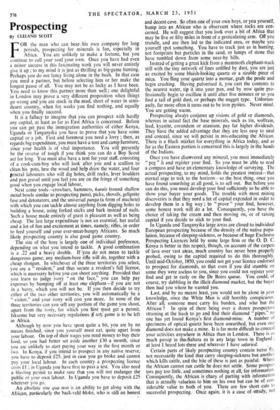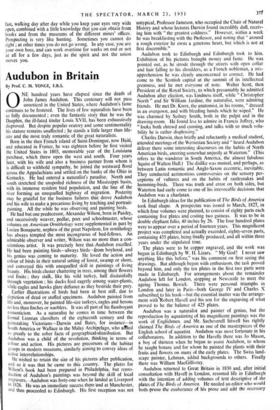Prospecting
By CLELAND SCOTT
FOR the man who can bear. his own company for long periods, prospecting for minerals is fun, especially in Africa. You are unlikely to make a fortune, but you continue to call your soul your own. Once you have had even a minor success in this fascinating work you will never entirely give it up ; to my mind it is just as thrilling as big-game hunting. Perhaps you do not fancy living alone in the bush. In that case you need a partner, but before selecting him or her make the longest pause of all. You may not be as lucky as I have been. You need to know this partner more than well ; one delightful in London may prove a very different proposition when things go wrong and you are stuck in the mud, short of water in semi- desert country, when for, weeks you find nothing, and equally when you finally succeed. It is a fallacy to imagine that you can prospect with hardly any capital, at least as far as East Africa is concerned. Before you can get past the immigration authorities of either Kenya, Uganda or Tanganyika you have to prove that you have some capital or a job. First and foremost you need a lorry ; then, as regards big expenditure, you must have a tent and camp furniture, since your health is of vital importance. You will presently be the reverse of tough if you think you can do a Boy Scout act for long. You must also have a tent for your staff, consisting of a cook-cum-boy who will look after you and a scullion to clean his pots, hew the wood and help draw the water, and four general labourers who will dig holes, drill rocks, lever boulders and pan gravel until you feel you are on the fringe of something good when you engage local labour. Next come tools—crowbars, hanimers, *antis (round shallow metal bowls similar to prospecting pans), picks, shovels, gelignite fuse and detonators, and the universal panga (a form of machete) with which you can tackle almost anything from digging holes to building a house, using forked sticks and bark instead of nails. Such a house made entirely of grass is pleasant as well as being cheap. The last large expenditure is not an essential, but useful and a lot of fun and excitement at times, namely, rifles, in order to feed yourself and your ever-meat-hungry Africans. So much likely prospecting country is also good game country.
The size of the bore is largely one of individual preference, depending on what you intend to tackle. A good combination is a .22 and a heavy double. If tyou do not mean to tackle dangerous game, any medium-bore rifle will do, together with a cheap shotgun. In whichever of the three territories you select, you are a " resident," and thus secure a resident's full licence, which is necessary before you can shoot anything. Provided that you learn to judge ivory " on the face," you can help pay expenses by bumping off at least one elephant—if you are not in a hurry, which you will not be. If you then decide to try tither of the two other territories, you will automatically be a " visitor," and your ivory will cost you more. In none of the three territories can you sell any portion of the game you shoot, apart from the ivory, for which you first must get a permit. Irksome but very necessary regulations tf any game is to be left in Africa.
Although by now you have spent quite a bit, you are by no means finished, since you yourself must eat, quite apart from your labour. On top of their wattes you need money to buy their food, so you had better set aside another £30 a month, since you are unlikely to start paying your way in the first month or two. In Kenya. if you intend to prospect in any native reserve, you have to deposit £25, just in case you go broke and cannot pay your local labour. In each country a prospecting licence costs £1 ; in Uganda you have first to pass a test. You also need a blasting permit to make sure that you will not endanger the public or your own labour. In Uganda you have to deposit £25 wherever you go.
An absolute sine qua non is an ability to get along with the African, particularly the back-veld bloke, who is still an honest and decent cove. So often one of your own boys, or you yourself, bump into an African who is observant where rocks are con- cerned. He will suggest that you look over a bit of Africa that may be five or fifty miles in front of a gesticulating arm. Off you trundle, and are then led to the indicated area, or maybe you yourself spot something. You have to track just as in hunting, not footprints but particles in the sand, or lumps of stone that have tumbled down from some near-by hills.
Instead of getting a great kick from a mammoth elephant-track still with the tiny network of lines unfilled by dust, you are just as excited by some bluish-looking quartz or a sizable piece of mica. You fling your quartz into a mortar, grab the pestle and begin crushing. Having pulverised it, you cart the contents to the nearest water, tip it into your pan, and by now quite pro- fessionally begin to oscillate it until after five minutes or so you find a tail of gold dust, or perhaps the nugget type. Unfortun- ately, far more often it turns out to be iron pyrites. Never mind. You are getting warm.
Prospecting always conjures up visions of gold or diamonds, whereas in actual fact the base minerals, such as tin, wolfram, lead, kyanite, corundum or uranium, pay far higher dividends. They have the added advantage that they are less easy to steal and conceal, since we will persist in mis-educating the African. There is a black m'a'rket for everything in Africa today, and as far as the Eastern portion is concerned this is largely in the hands of the Indians.
Once you have discovered any mineral, you must immediately " peg " it and regiSter your find. So you must be able to read a compass and have an elementary knowledge of surveying. The actual prospecting, to my mind, holds the greatest interest—that eternal urge to trek to the horizon—so the best thing, once you have found something at all good, is to sell out. But before you can do this, you must develop your find sufficiently to be able to show your buyer your goods. The trouble with most mining discoveries is that they need a lot of capital expended in order to develop them in a big way ; to " prove " your find, however, some honest work will do a lot. Consequently, you have the choice of taking the cream and then moving on, or of raising capital if you decide to stick to your find.
In Uganda and Tanganyika large areas are closed to individual European prospecting because of the density of the native popu- lation, because of sleeping-sickness, or because of huge Exclusive Prospecting Licences held by some large firm or the 0. D. C. Kenya is better in this respect, though, on account of the carpets of lava over vast areas, much country has never been properly probed, owing to the capital required to do this thoroughly. Until mid-October. 1950, you could not get your licence endorsed to prospect for diamonds, so that even if you did stumble on some they were useless to you, since you could not register your find and get in early on the De Beers queue. You could, of course, try dabbling in the illicit diamond market, but the buyer then had you where he wanted you.
Last, and by no means least, you would not be alone in your knowledge, since the White Man is still horribly conspicuous. After all, someone must carry his burden, and who but the African ? In spite of there being over a dozen prospectors straining at the leash to go and find their diamond " pipes," no one has yet found Kenya's first diamond-mine. A number of specimens of optical quartz have been unearthed, but even one diamond does not make a mine. It is far more difficult to conceal your activities anywhere in Africa than in London. There is as much gossip in theitSahara as in any large town in England : at least I heard lots there and wherever I have salaried.
Certain parts of likely prospecting country contain tsetse fly. not necessarily the kind that carry sleeping-sickness but another which kills cattle, and the bite of these is just as painful. Where the African cannot run cattle he does not settle. Some prospec- tors pay too little, and sometimes nothing at all, for information. Consequently. the African is chary of parting with information that is actually valueless, to him on his own but can be of con- siderable value to both of you. There are few short cuts to successful prospecting. Once again, it is a case of steady, not fast, walking day after day while you keep your eyes very wide open, combined with a little knowledge that you can obtain from books and from the museums of the different mines' offices. Prospecting is very like hunting. Sometimes you cannot do right ; at other times you do not go wrong. In any case, you are your own boss, and can work overtime for weeks on end or not at all for a few days, just as the spirit and not the union moves you.



































 Previous page
Previous page